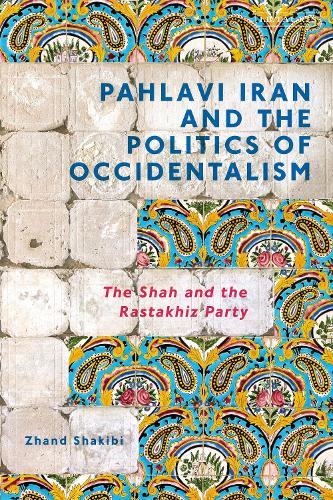
Pahlavi Iran and the Politics of Occidentalism: The Shah and the Rastakhiz Party
(Hardback)
Available Formats
Publishing Details
Pahlavi Iran and the Politics of Occidentalism: The Shah and the Rastakhiz Party
By (Author) Zhand Shakibi
Bloomsbury Publishing PLC
I.B. Tauris
12th December 2019
United Kingdom
Classifications
Tertiary Education
Non Fiction
Economic history
Revolutionary groups and movements
Middle Eastern history
320.95509048
Physical Properties
Hardback
464
Width 160mm, Height 236mm, Spine 28mm
780g
Description
Zhand Shakibi presents a new interpretation of the political and social dynamics of the last decade of the Shahs rule that challenges the binary view of pro-West Shah and anti-West Ayatollah by drawing attention to the Pahlavi states reaction to the intellectual and societal backlash against cultural and moral Occidentalism in its last decade. Revising the dominant historiography of the Pahlavi ideological and discursive approach to the West, this book draws attention to the changes in the attitude of the Shah, the Empress and state intellectuals towards the position and imagery of the West in state conceptions of the authenticity of Iranian national culture and identity. Drawing on a wide-range of primary sources, Shakibi presents the multi-faceted relationship of the Pahlavi state to the West and the institutions that were created to manage this such as the Rastakhiz Party. This study argues that the Pahlavi state, having recognized this backlash, attempted to limit the threat to its legitimacy by reformulating intellectual discourses of anti-West Occidentalism and incorporating them into the ideology of the Rastakhiz Party. In so doing it played a critical role in exacerbating societal sensitivities about the spread of Western influences.
Reviews
It has been 40 years since the Iranian Islamic Revolution, and scholars continue to try to figure out what happened. The usual assumption is that the revolution represented a break from the pro-Western policies of the Shahs government. But in Pahlavi Iran and the Politics of Occidentalism, Shakibi argues that in fact in the last years of the monarchy the Shah himself had begun to develop anti-Western and pro-Iranian policies The author finds useful comparisons to the French Revolution, and in particular compares the rule of the Shah to the reign of the Romanovs in pre-Soviet Russia. In making his case Shakibi draws on sources in English, Russian, and Persian, including the archives of the Rastakhiz newspaper Summing Up: Recommended. Graduate students, researchers, faculty. * CHOICE *
An extremely thoughtful and interesting work by a scholar who combines deep knowledge and empathy for the world of Pahlavi- era Iran with sharp analysis and informed comparisons, above all with Imperial Russia. * Professor Dominic Lieven, University of Cambridge, UK *
In this ground-breaking work, Zhand Shakibi provides us with a detailed intellectual history of the Pahlavi states anti-West Occidentalism, marking a major contribution to the emerging field of Pahlavi Studies. In doing so, Shakibi compels us to re-examine many familiar tropes in the historiography of late Pahlavi Iran and to consider continuities in the longue dure of modern Iranian history, which transcend the 1979 Revolution. * Roham Alvandi, Associate Professor of International History, London School of Economics and Political Science, UK *
Author Bio
Zhand Shakibi is Fellow at the IDEAS Institute at the London School of Economics, UK, and the author of Khatami and Gorbachev: Politics of Change in the Islamic Republic of Iran and the USSR (2010).
